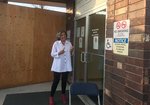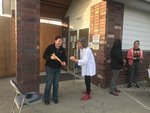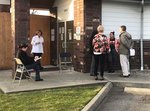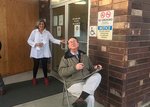



Health and Hope Medical Outreach in Centralia, which provides medical care once a week to uninsured and underprivileged people in Lewis County, has closed to new patients and urgent care needs for four to six weeks.
HHMO, a 100-percent volunteer-run organization, will still be open on 5:30 p.m. to 6:30 p.m. Tuesday evenings to allow current patients to get prescriptions refills. HHMO is located in the Northwest Pediatric Center building on Cooks Hill Road in Centralia and opens after the pediatric center is closed. The free clinic has been operating since about 2012.
On Tuesday evening on March 17 the doctors, Dr. Jennifer Polley and Dr. Mike Strohbach, and a few volunteers were standing outside of the HHMO clinic and meeting patients at their car window or outside of the clinic to refill their prescriptions.
Along with those getting their prescriptions refilled, Jennifer Keller, an HHMO patient, came to the clinic on Tuesday evening to get a doctor’s note saying she was not showing any symptoms of COVID-19 to take to a temp agency to try to get another job after being laid off from her retail outlet job earlier that day.
Health and Hope Medical Director of Dr. Jennifer Polley said the clinic made the decision to close to new patients and limit care due to a couple of factors.
“Since we have a volunteer staff and a lot of the staff is older we can’t put them at risk. The other issue is a logistics issue. At Northwest Pediatrics, this is the ‘well building,’ so we are not having anyone who is sick in this building at all,” said Polley.
Another main reason HHMO had to limit care was the lack of volunteers. Polley said that many of the volunteers were older and a part of the at-risk population. The HHMO treats many patients with ongoing conditions such as diabetes and hypertension who need prescriptions regularly refilled.
“We thought that what we can do is at least make sure people can get their medications and basic questions answered,” said Polley on Tuesday evening outside of the clinic. “We’re listening to the recommendations from the health department but I’m hoping that in four to six weeks we will be able to be back at it. That’s the plan.”
Polley said Health and Hope Medical Outreach does not have the space to keep sick people completely separate from one another and that supplies are limited.
“We just can’t give the kind of care that we would like to give. We can’t see (patients) in the same way, so we are going to have to send them to some other places at times. … If we can keep the disease from spreading quickly then we can keep people safe and that’s the big goa l— how do we save the lives of people in the long run,” said Polley.
Dr. Mike Strohbach, a volunteer family practice doctor at HHMO as well as a doctor at Providence Centralia Hospital, said that most people in Lewis County are suffering financially rather than physically due to the virus.
“You always get the worried-well in the hospital but I don’t think there’s reason to panic. Just take the normal precautions— wash your hands, don’t touch your face, stay home if you’re sick. For about 85 percent of the people that contract the virus it should be a very mild illness,” said Strohbach.
Strohbach said that normally if you let everyone get together and catch the virus at one time, t shortens how long the virus will be in the community. He gave the example of having his four kids exposed to the chickenpox at the same time instead of prolonging the process by keeping the children separate.
However, when it comes to COVID-19 if everyone gets sick around the same time hospitals just don’t have enough respirators or space to care for everyone at once.
“I’ve been in pediatric care for 30 years and something like this has never happened. It’s a very unusual situation. You have influenza and it’s terrible, lots of people die, but (COVID-19) does appear to be different. We just don’t know enough about it yet. But we are going to do our best job to keep people safe,” said Polley.